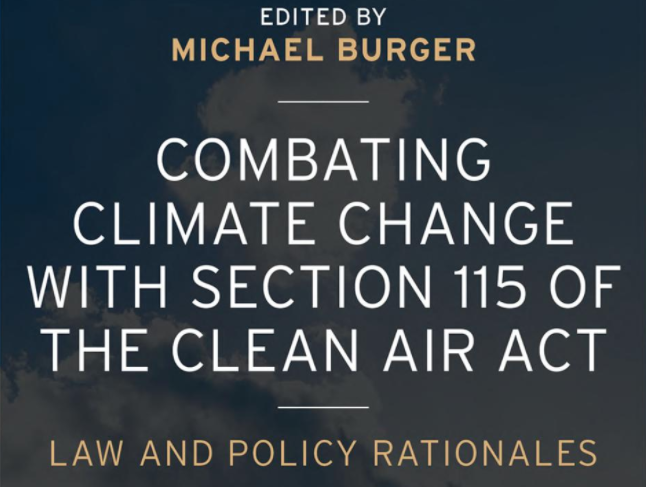By Michael Burger and Hillary Aidun
On September 19, the High Court of Ireland issued an important decision upholding the government’s national climate action plan against a legal challenge. Friends of the Irish Environment claims that the plan fails to set adequately ambitious short-term greenhouse gas emission reduction targets, and is inconsistent with a 2015 statute, the Irish Constitution, and the European Convention on Human Rights (ECHR). The court, however, concluded that the government acted within its policy making discretion under Irish law. The court further held that, having determined that the plan was the first of many steps towards Ireland’s midcentury climate goals, it could not find that the plan violated any rights protected by the Irish Constitution or the ECHR.
The decision comes at a busy moment in global climate litigation, with similar lawsuits challenging the adequacy of other governments’ climate ambition pending in Canada (ENVironnement JEUnesse), Germany (Family Farmers & Greenpeace Germany), France (Commune de Grande-Synthe), Norway (Greenpeace Nordic Association & Nature & Youth), Switzerland (Union of Swiss Senior Women), Belgium (VZW Klimaatzaak), the European Union (Carvalho), India (Pandey) and Pakistan (Maria Khan), as well as in the United States (Juliana) and the Netherlands (Urgenda). Greta Thunberg and fifteen other children recently filed a petition with the United Nations Committee on the Rights of the Child claiming that five countries’ failure to address climate change violates their rights under that treaty, and the Torres Strait Islanders recently filed a separate petition with the United Nations Committee on Human Rights claiming that Australia’s climate inaction violates their human rights under international law. In this context, the significance of the High Court’s decision lies not only in its rationale for upholding Ireland’s plan, but also in its recognition that advocacy groups may bring rights-based claims to enforce states’ climate commitments, and of the science underpinning the urgent need to strengthen and meet those commitments.
The Case
In 2015 Ireland enacted the Climate Action and Low Carbon Development Act (“the Act”). The Act sets Ireland’s goal of transitioning to a low-carbon, climate resilient, and environmentally sustainable economy by 2050, and requires the government to issue a National Mitigation Plan to achieve that objective. The Act further instructs the government to take account of climate justice and of Ireland’s existing commitments under Irish, European and international law. In 2017 the Irish government approved a National Mitigation Plan (“the Plan”) pursuant to the Act.
Friends of the Irish Environment (FIE) challenged the Plan, alleging that it fails to achieve short-term emissions reductions necessary to avert the risk of damage from climate change. FIE argued that the Plan contravenes the Act because it does not require adequate steps to achieve Ireland’s 2050 national transition objective. FIE further contended that the Plan fails to uphold Ireland’s obligations pursuant to international law and climate justice, which, in FIE’s view, demand that Annex I countries reduce greenhouse gas emissions by 25-40% by 2020. Moreover, FIE claimed, the Plan violates the rights to life and to respect for private and family life enshrined in the ECHR, as well as rights protected by Ireland’s Constitution including the rights to a reasonable environment, to intergenerational solidarity, and to vigilantly and effectively protect the environment. FIE asked the court to quash the Plan and, if appropriate, to order that a new plan be written; and to declare that the Plan was in violation of the ECHR and the Irish Constitution and failed a test of reasonableness.
FIE’s Standing to Bring Rights-Based Claims
The government did not dispute that FIE had standing to challenge the Plan as inconsistent with the Act. However, the government contended that FIE lacked standing to enforce rights that can only be claimed by individuals, such as the right to life, and could therefore not bring claims under the ECHR and the Irish Constitution. The court rejected this argument. The court reasoned that the question of standing must be resolved by considering whether a plaintiff’s interests – as opposed to its rights – will be affected by the challenged action. Because FIE’s case concerned important issues affecting both its members and the public at large, it sufficiently established standing to brings claims against the Plan under the Constitution and the ECHR.
The Court’s Endorsement of Climate Science and National Responsibility
Before reaching the merits of the case, the court made significant findings regarding the dangers posed by climate change and need to take swift action. The court explained that “[t]he scientific community agrees that global warming can be prevented, mitigated or reduced by ensuring the reduction of the emission of greenhouse gases into the atmosphere but significant effort is required,” and rejected the notion that a state’s inability to tackle the issue on its own lessens the burden to achieve science-based targets. Moreover, as the Irish government laid out in the Plan’s introduction, Ireland is already experiencing diverse and wide-ranging impacts and will be threatened by sea-level rise, more intense storms, water shortages, and increased risk of new pests and diseases in the future.
Additionally, the court adopted the summary of the climate problem, and the acceptance of the reality of a carbon budget, contained in the landmark decision Urgenda Foundation v. State of the Netherlands. The court explained that “if the concentration of greenhouse gases has not exceeded 450ppm in the year 2100, there is a reasonable chance that the 2o C target will be achieved,” but 1.5o C is the only “safe temperature rise target,” and therefore, “there is now limited room, or budget, known as a carbon budget, for greenhouse gas emissions.”
The court’s ultimate conclusion, in other words, did not stem from any skepticism regarding the scientific consensus on the urgent need to make deep emissions cuts, the threats to Ireland posed by climate change, or Ireland’s responsibility to do its part. In fact, the court’s decision makes plain the authoritative nature of climate science, and that “[t]he need for action is undoubted.”
Separation of Powers
As discussed, FIE first claimed that the Plan violates the Act by failing to achieve sufficient short-term emissions reductions. The government argued that the Plan is a non-justiciable statement of policy and thus not subject to judicial review. Warning that “the court should . . . be slow to determine that an issue is not justiciable and therefore excluded from review,” the court avoided expressly reaching the question, determining that even if the Plan is reviewable it is not in contravention of the Act. The court reasoned that the Act provides considerable discretion to the government with respect to how to achieve the 2050 national transition objective, and that to invade the government’s policy making function would violate the separate of powers.
However, the court did not find that the Act gives the government carte blanche. Rather, in the court’s assessment, the Plan is valid because it does contain a proposal to reach the national transition objective and makes adequate reference to Ireland’s existing European and international obligations, as the Act requires. Moreover, the Plan must be reviewed every five years, and therefore is not Ireland’s final response to climate change. The court further explained that if the Plan is insufficient, the ultimate deficiency lies with the Act, which was not challenged. Because the Plan could not be said to represent an inadequate response to climate change pursuant to the Act, the Court concluded, it does not violate Ireland’s human rights obligations under the ECHR or the Constitution, and is not unreasonable.
The court distinguished Urgenda on a number of grounds. In Urgenda, a Dutch appellate court ruled that the Netherlands had violated the rights to life and to respect for private and family life provided by the ECHR by not aiming to reduce its greenhouse gas emissions by 25% by 2020. As the High Court explained, in Urgenda the Dutch government had initially set an emissions reduction target of 30% for 2020 and then downsized its goal without a stated reason. Moreover, the High Court reasoned, in Urgenda the plaintiffs had challenged a standalone policy as violating human rights. Here, by contrast, FIE sought to block a measure that represented merely the first of many steps towards achieving a policy goal pursuant to a statute that afforded broad discretion.
The High Court’s decision is readily distinguishable from Leghari v. Federation of Pakistan. In Leghari, the Lahore High Court ordered the government to take action pursuant to the National Climate Change Policy of 2012 and the Framework for Implementation of Climate Change Policy (2014-2030), which had simply not been implemented. The Irish case is also distinct from lawsuits such as Juliana v. United States, in which plaintiffs seek to compel government action in the absence of any framework climate change legislation. It is also distinguishable from cases such as Carvalho et al v. European Union and ENVironment JEUnesse v. Canada, which challenge the adequacy of climate legislation. FIE did not challenge the Act, but rather, argued that the government’s plan to meet the goals set forth in the Act was inadequate.
Importantly, the Irish court did not conclude that it was utterly without power to hold the government to account, clarifying that “[t]here may be circumstances in which a court may make a mandatory order against an organ of state, but only when there is a clear disregard by the State for its constitutional obligations.” Ireland, as the court described at length, is taking significant steps towards a mid-century goal adopted by the national legislature. It is possible that those steps are not ambitious enough, but the court appeared persuaded that the government was acting deliberately and reasonably.
FIE is considering grounds for appealing the decision. In the meantime, the court’s conclusion that it is restrained by the separation of powers, in these particular circumstances, offers another data point in the growing universe of rights-based climate litigation.




